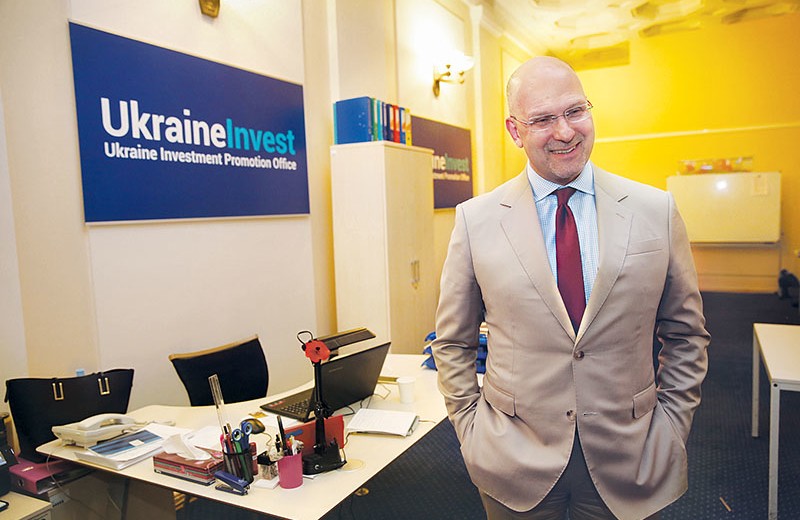Deep inside the massive Soviet-era building of the Cabinet of Ministers of Ukraine, there is a small Western-style open-plan workspace. A glass wall separates it from the surrounding world of huge offices with secretaries and waiting halls.
This is the realm of Daniel Bilak, a Canadian lawyer who was among the first Westerners to move to Ukraine in its early days of independence.
Today, Bilak serves as the chief investment adviser to Prime Minister Volodymyr Groysman, whose office is six floors up.
In October, Bilak took a one-year sabbatical from his job as a partner at the Ukraine office of CMS Cameron McKenna law firm to lead UkraineInvest, a government-backed initiative aimed at promoting Ukraine among foreign investors.
The role isn’t entirely new to Bilak. During Leonid Kuchma’s presidency (1994-2005), Bilak advised him, the prime minister and the minister of justice.
Focus on regions
Currently, Russia remains one of the main investors in Ukraine’s economy, along with tax havens Cyprus and the British Virgin Islands. Bilak wants that to change.
So his agency, UkraineInvest, targets investors from the Americas, Europe, Asia, and the Middle East.
“We want investors that understand the rule of law, because they bring not only investment but also the culture of doing business and management,” Bilak says.
He says it’s a common misconception that Western and Asian investors don’t want to work in Ukraine. There are, in fact, many of them, and over the years they have formed industrial clusters in various regions.
For instance, western and central Ukraine is the heartland of foreign automotive businesses in Ukraine. Over 20 German, French, Japanese, American, Polish, and Swiss companies manufacture car parts at plants in nine oblasts. Together, they employ 43,000 people and have invested over $500 million, says Bilak.
Another cluster is located in southern Ukraine — in Mykolaiv, Kherson and Odesa oblasts. This part of the country is the territory of major agricultural holdings and logistics businesses.
Furniture and wood-making businesses, mostly Italian manufacturers, are clustered in Zhytomyr Oblast.
Bilak isn’t just interested in attracting new money to Ukraine. He also wants investors who are already here to expand.
“Our goal at UkraineInvest is to encourage existing companies to increase investment,” Bilak says. “The more happy investors we have on the market, the easier it will be to attract new ones.”
UkraineInvest has identified its strategic sectors as agriculture, energy, infrastructure and manufacturing, as well as innovation and technology, which can be combined with the other four.
To better address the needs of investors in western Ukraine, the agency opened a branch in Ivano-Frankivsk in June. The office will manage seven oblasts Bilak says he plans to open two more offices — in Dnipro and Vinnytsya — this year.
The system
Recently, Bilak has been criticized for excessively praising half-baked reforms that Ukraine rushed through under pressure from the European Union and the International Monetary Fund.
He was accused of ignoring the fact that no high-profile corrupt officials had been punished, stolen assets hadn’t been recovered and none of reforms that he touted as achievements — land, police, pension, health, education, privatization — had been fully implemented.
In fact, the problematic areas that businesses complain about the most, according to the Business Ombudsman, are still tax, customs and law enforcement. These, and the court system, have yet to reform.
But Bilak gets no argument that Ukraine has made more progress in the three years since the EuroMaidan Revolution, which ousted the corrupt regime of President Viktor Yanukovych on Feb. 22, 2014, than in the preceding 23 years since the collapse of the Soviet Union.
“The key reforms that are being rolled out now would be a significant undertaking in any developed country, let alone Ukraine with its lack of institutional capacity,” Bilak says.
Ukraine, simply put, still organizes its governance, judiciary and other institutions from its Soviet heritage. Shaking off the Soviet legacy requires time and patience.
“Three years ago we started deconstructing Soviet-era institutions and changing how they work to build democratic ones. There’s no manual on how to do it,” he says. “To those who want to see fast changes, I say that it doesn’t happen that way. It’s a parallel progression, not a linear one.”
Image issues
Despite Russia’s war against Ukraine, Bilak says investors are more concerned about political uncertainty and corruption.
“Ukraine is a huge country. When we say it’s corrupt, does it mean every government agency or oblast are corrupt?” Bilak asks rhetorically.
His job now is to explain the real situation in Ukraine to foreign businesspeople, he says.
“I want them to have a very realistic look at what risks and opportunities this country has got, and then make an informed decision, not be skewed by uninformed journalists and Russian trolls,” Bilak says.
In March, UkraineInvest hosted the first Japanese business delegation from 21 Japanese companies, including Marubeni Corporation, the top Japanese importer of Ukrainian grain, automotive giant Mitsubishi, and electronics manufacturer Panasonic.
“I like it when investors come to Ukraine,” Bilak says. “It blows away some of the negative images and preconceptions about the country.”
But he adds that foreign direct investment takes time. The gestation period of a large project can be up to two years, and each requires a negotiation process and a feasibility study.
“I don’t like the word ‘potential.’ I’ve been hearing it for 26 years,” Bilak says. “Opportunities, however, is fair game, because that’s what we do have here.”



